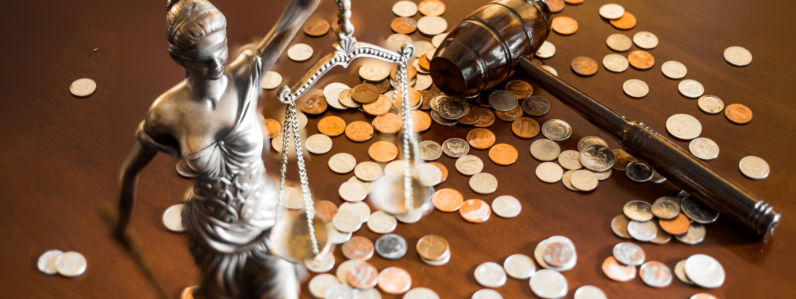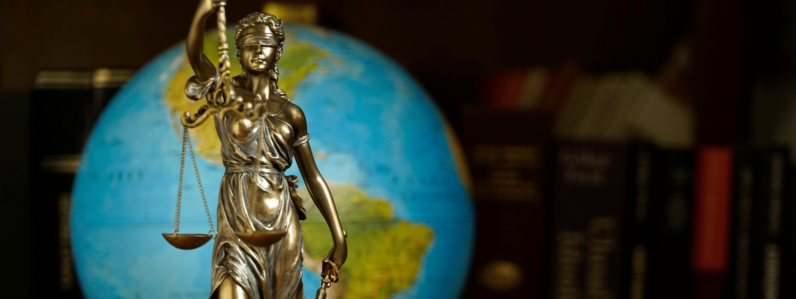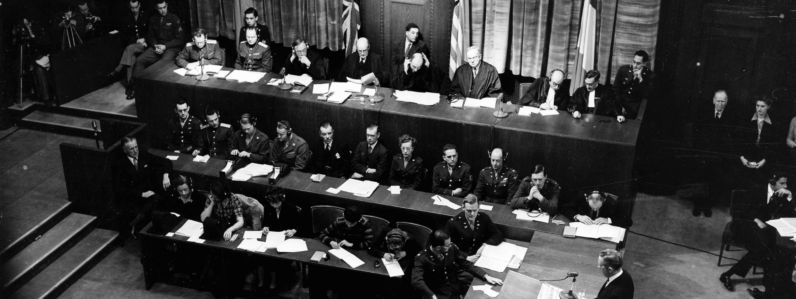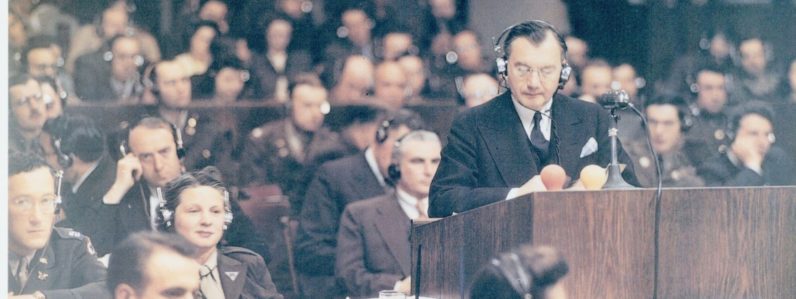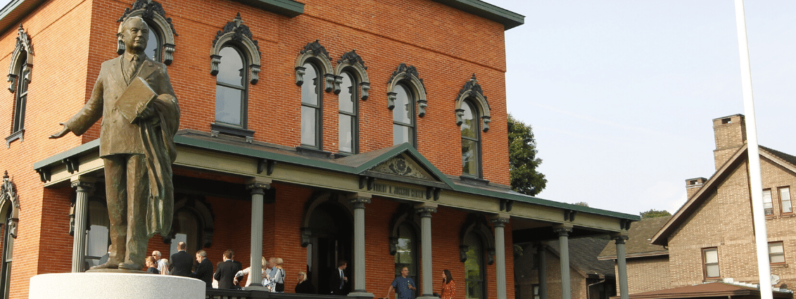I am glad to join with you in honoring your guest of honor, David J. Lewis. He has been an inspiration to forward looking people everywhere for a generation. I have long respected his example and valued his friendship.
Likewise, I am glad to speak to a group whose purpose, as I am informed, is to be liberals without ceasing to be Democrats, and to be Democrats without ceasing to be liberals.
Since I am a stranger to any local aspects of your endeavor I can be most helpful in discussing some of the attributes of liberalism which do not depend either upon time or personalities, or even locality.
In a section where Democrats were so few as to be almost curiosities and were so unpopular as to be almost denied the protection of the game laws, my family have been consistent Democrats because they found in the position and in the promise of the Democratic Party an answer to their aspiration for a liberal government.
I never knew a Democratic victory for a local official where I have lived. I never practiced before but one elected Democratic Judge in the courts of my county and district. I was always given to understand that, by being a Democrat, I could never hold a public office - and had always expected the prediction to be true.
Under these circumstances when one generation hands a democratic tradition on to another, it leaves also a legacy of fighting faith in something rather deep- something that lays hold of loyalties that take no account of defeats. That is a belief in the kind of government which the nation has had, with only rare exceptions - only from Presidents elected by our party.
Political liberalism as an attitude has dominated the constructive administration of Washington and Jefferson, of Jackson and of Lincoln, of Wilson, and of Franklin D. Roosevelt. It is democracy at its flood tide, just as conservatism is its ebb. They are apt to alternate in political history. But as an influence it is never destroyed by elections and when it is out of office at the ebbing, it is gathering force for the next flood tide. Witness 1920 to 1932. Liberalism is not a particular measure or platform, but is rather an underlying attitude towards all problems and platforms. Hence, it is timeless and always needed. Its program is never a finished one.
Liberalism is difficult to define and limit because it is a continuing attitude toward problems of government, rather than merely a fixed code of principles. But one fixed and unalterable purpose is the support of democracy, not as a mere form of government, but as an underlying philosophy with deep spiritual meaning. Thomas Mann, who has had an ample experience with other forms of government, warns us that every definition of democracy is insufficient, but proceeds to give us one of the best working definitions as follows:
“We must define Democracy as that form of government and of society which is inspired above every other with the fooling and consciousness of the dignity of man.”
The achievement and protection of this kind of democracy has always been the special care of the liberal, and so for in our history it has found its most effective champions in leaders of the Democratic Party. But the dangers from which it must be protected change from generation to generation, and the direction of our watch must shift as the enemies of democracy take up different positions. Confusion as to what is liberalism in our own time proceeds from the fact that while liberalism is always defending the same goal it must change front from time to time in order to face new dangers. It is this kind of confusion, for example, which enables John D. M. Hamilton, with a perfectly straight face, to place a wreath on the tomb of Thomas Jefferson.
In the Jeffersonian era the dangers to democracy were only political dangers. Great stretches of wilderness offered to all men about an equal opportunity to produce the primitive necessities of life. It was a tough life, but so far as making a living was concerned there was a pretty general equality of hardship and a general distribution of poverty. In that day, if men sought to oppress other men, they used government for the purpose, and it was against government that safeguards were erected. In order to protect the individual the Constitution concerned itself with legalistic and political rights. It ignored pretty generally the economic conflict which was then perceived but vaguely, if at all, because it was only beginning to arise. The fundamental rights which the Constitution guards are those necessary to the individual's sense of personality, - his right to speak freely and to print his views, his right to worship in his own way, to be secure in his own home, to acquire and possess property, to petition his government, to be tried for crime only by his fellow men, and to participate through representation in the shaping of the policy of his government. The liberals of Mr. Jefferson's time fought to incorporate in our Constitution those pledges to respect, to this extent, the dignity of man. As frontiersmen, with an unexploited continent before them, they regarded these prohibitions upon government as sufficient to assure the self-respect of men and women engaged in planting on this continent a predominantly agricultural civilization. The liberal thought of that day regarded as its great task the establishment of a bill of rights which would give government no power to break down the spiritual values of a democratic society.
In time these principles came to be accepted even by conservatives, and all administrations in our history have shown a fairly high degree of fidelity to those limitations on the power of government affirmatively to invade the rights of individuals and of minorities. Exceptions would, of course, have to be made of the Federalist alien and sedition hysteria under John Adams and of the lawlessness of reconstruction days. And I do not feel any too happy about the extremes of World-War days. But, by and large, the liberals of Jefferson's day created a pretty effective instrument to protect the individual from the assaults of government itself.
But the efforts of Jefferson’s period by no means exhausted the work of liberalism in the nineteenth century. There were other impediments to democracy which the liberals later, under the leadership of Andrew Jackson, made it their business to knock down. It was in the Jacksonian days that liberalism began to take on an economic aspect, and to concern itself with abuses concerning property. The beginning of the Jacksonian era saw the right of men to vote in nearly every state of the Union limited by a property qualification. Man, as man, had no voting rights. The polls were open only to man plus some given amount of property. As a consequence, a numerous class was without that voice in government which experience proves to be the only real protector of other rights. The Jacksonian liberals were everywhere engaged in removing this qualification, and they were rewarded by the newspapers of their day by the reputation of catering to the mob. Imprisonment for debt was another consequence of belonging to the submerged one-third of Jackson’s era. And, in its time, it caught such eminent patriots as Robert Morris and made a fugitive of a Justice of the Supreme Court. The Jacksonian liberals engaged in campaigns to end imprisonment for debt and were held up as enemies of property. Public lands constituted the relief funds of that day, and a complacent government had permitted a vicious system of allotting the lands to speculators who, in turn, parceled it out to actual settlers upon terms of greatest advantage to the land companies. There land companies made large speculative profits, charged high rates of interest, and when they foreclosed, obtained for themselves the cabins which the pioneers had built and the clearings they had made, which the companies resold to others at an advanced price.
The Jacksonian liberals fought to end this system, to cut out the speculator’s advantage and to make grants of public lands only directly to those who were to homestead upon them. Their reward was to be accused of being enemies of business.
In a frontier civilization where accumulations of capital are scarce, credit is a vital thing and its terms are high. Prior governments had conferred a virtual monopoly of credit upon the great Bank of the United States, in turn, had shamelessly employed most of the leading public men of its time as its attorneys. Only in recent years has it been disclosed that Andrew Jackson was fully justified in his charge that this credit monopoly created a panic and an artificial credit stringency in his administration in order to force a renewal of its charter. The political liberals of Jackson’s school thus came to fear monopoly and to battle against concentrated financial power.
On into the twentieth century the more important struggles were of the Jacksonian character, involving economic rights, such as the regulation of railroads, the right to establish an income tax, the right to make the notes of the United States legal tender, and similar matters.
It is a characteristic of political thought that reforms come to be accepted by everybody only after liberals have risked their political lives and fortunes to obtain them against the most bitter opposition of the smug elements of society. Then the once drastic measures are no longer thought of as liberalism, but as Americanism. And the reactionaries adopt the names and slogans of deceased liberals in order to discredit living ones. Meanwhile the liberals have to face new fronts because the dangers come from another quarter.
By 1932 the frontier had disappeared. The public lands were gone, and only the scandals of their administration remained. Our way of living had changed. Men could no longer walk into the wilderness and wring a living from nature. To get a living they must be accepted at an employment office, and the employment offices were in the hands of very impersonal and very cold-blooded corporations. It had become much less important to the average man under what Mayor he lived than under what kind of a boss he worked. When he left the factory premises, the Government respected his rights pretty generally. His chosen representatives could not interfere with his free speech or free press or right of assembly. But spies sent out by his employer were bound by no such restrictions and if his free speech took the direction of trying to improve his lot through organization, he was likely to find himself in a sort of industrial Siberia.
Therefore, it came about that the liberal movement of our time has been cast largely in the mold of economic liberalism which makes its parallelism to the Jacksonian era more obvious, although none the less real, than its parallel to the Jeffersonian liberalism. The liberalism of our day is concerned with the right of men in industry to be free from unfair labor practices, to enjoy the privacy of their individual lives without the invasion of labor spies, the right collectively to bargain, the right to have some security of tenure in their jobs against arbitrary dismissal, and the right to a place in our economy where they can apply their labor in return for the commodities which labor produces. And we are also concerned with the right to see that the surplus of production, above what labor consumes while producing, is in a proper proportion applied to protection against unemployment and against dependent old age, against industrial accident, and against illness.
The modern problem is to make the economic system serve the social system, instead of master it; to bring about such a distribution of the products of industry as will protect an American way of life in the homes of the workers. Incidental to this are many problems, in the detail of which men may disagree, but by and large, the liberal looks first to the effect of a given measure on the social system and on the lives and welfare of the people. The organs of publicity are almost entirely in the hands of the opposition and a favorite method of discrediting the liberal is to luridly overstate his true purposes.
We have repeatedly been charged, for example, with being hostile to business and seeking to destroy private enterprise. What we have tried to do is to preserve private enterprise by destroying the abuses which prey upon it and eliminating the practices by which certain parasites, who call themselves business men, prey upon legitimate business. We seek to eliminate dishonesty and fraud in the sale of securities, false valuations and manipulations or power properties. We seek to stop some business men from destroying other business men by unfair competition and monopolistic practices. To try to get this sort of parasitic practice off from the back of business is no more hostile to business than it is hostile to a dog to try to rid him of fleas.
I suppose that it would be the most useful service to liberalism if we could devise some authoritative way in which to make a frank and adequate formulation and statement of the philosophy, the ultimate purposes, and the immediate proposals of American political liberalism. Lacking a vehicle for such a collective statement, on which we would probably have some difficulty in agreeing, we must look to the acts and words of our leadership for unambiguous liberalism that cannot be confused by the honest and informed with communism or socialism on the one hand or with fascism or undemocratic aims on the other. And we will have to rely on such agencies as your club to disseminate the story and to see that these who lack honesty do not succeed in misleading those who lack information. And the first necessity in avoidance of confusion to the others is to be quite clear about our purposes ourselves.
The chief abuses which liberals have to fight today are economic, related to property and the ways by which property is acquired. This makes it particularly easy for those who want to shelter the abuses to misrepresent the attitude of the liberal towards property itself.
The liberal concepts the main outlines of our existing economic system as desirable and as destined to endure at least for some generations. He accepts and champions the right to use one's talents and efforts to produce, acquire, and keep property. And the right of capital to a fair return for its work.
This means a definite rejection of communism, socialism, and fascism. To this extent we incur the contempt and bitterness of extreme left-wingers who regard us as conservatives. And I am inclined to agree with then that the liberal movement in America today is simply an intelligent and realistic conservatism. And I further understand their hostility to liberalism, because its success is the greatest barrier to their hope of leading Americans into communism or fascism.
But our acceptance of those property rights is subject to the important qualification that the interests of men and of society come first and that warns us both the misunderstanding and the hostility of conservatives.
First of all, we have insisted that capital be honest and that the law make it so and punish delinquency. A system of honest capitalism cannot tolerate the inflation of our investment structure through fantastic write-ups of property, such as the utility holding companies engaged in. The rights of property and the profit system do not include the right of a few men to put two and two together and make six out of it, and as a result either rob investors or gouge consumers or exploit labor.
Moreover, the liberal has always looked upon the possession of concentrated and irresponsible economic power in a few private hands as a menace to free government. In the first place, such a development in the business and financial world drives to on equal concentration and centralization of governmental authority in order to deal with it. And we cannot be complacent toward the gathering up by a few men of power to control commodity distribution and wage levels and the standard of living of working people and the resources for creating electric power and the control of credit and those other elements which make up our economic life.
The liberal insists on a bill of rights which will rigidly protect the individual and the minority against encroachments by the government and those elected to exercise power.
But the liberal does not stop here. He insists that the government shall also have and exercise power to see that the rights of the individual and of minorities are not encroached upon by private economic power.
The hope and usefulness of our party rests in its loyalty to its liberal tradition which is an inheritance that enriches not only all Democrats but all Americans.

